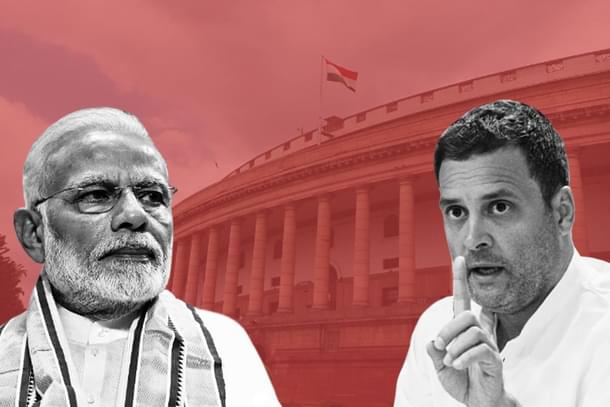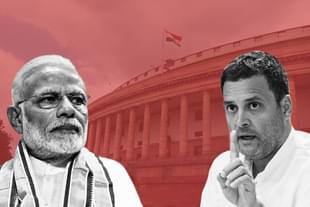Politics
Rahul's Attacks On Modi On China-Pak Nexus, Jobs And Poverty Are Largely Off The Mark
R Jagannathan
Feb 03, 2022, 03:04 PM | Updated 03:04 PM IST
Save & read from anywhere!
Bookmark stories for easy access on any device or the Swarajya app.


Rahul Gandhi launched yet another attack on the Modi government yesterday (2 February) in parliament, but barring two economic issues – unemployment and poverty – he was largely off the mark.
He made five points: one, that there were two Indias (rich and poor), and, two, the Modi government was only helping the rich. Three, during UPA millions were lifted out of poverty, but during the Modi regime, many of those were pushed back into poverty. Four, the judiciary and Election Commission were seriously compromised. And five, the Modi government, through its act of changing the status quo on Jammu and Kashmir, including the annulment of Article 370, has enabled a stronger Pakistan-China nexus against us – and we have now become globally isolated.
Let’s start with the last two first.
Did the Pakistan-China nexus begin after 2019? As External Affairs Minister S Jaishankar pointed out, the Pakistan-China nexus began from 1963, soon after India lost the war against China in 1962. Pakistan handed over the Shaksgam valley to China, and allowed it to build the Karakoram Highway in the 1970s through Pakistan-occupied Kashmir. The two countries also indulged in covert nuclear collaboration that might also have involved North Korea.
In fact, what Jaishankar did not mention was what should logically have been seen as the trigger for a greater Pakistan-China nexus. First, India and the Soviet Union signed a treaty of cooperation in 1971; this was followed by India handing a decisive defeat to Pakistan in the 1971 war that created Bangladesh; later, in 1974, Indira Gandhi exploded nuclear devices in the Pokharan desert.
These three events would have played a decisive role in (1) convincing Pakistan that it can never win a conventional war against India, and (2) China that it now had a nuclear neighbour it cannot engage with militarily. This made a Pakistan-China strategic tieup against India almost inevitable.
This is not to criticise Indira Gandhi’s actions in any way, and in fact they were necessary for India’s security. But if Rahul Gandhi had been an opposition leader in 1971, he would probably have accused his grandmother too of encouraging a Pakistan-China nexus and enabling our global isolation.
The truth is despite the Pakistan-China marriage of convenience, we are less isolated today than before. We are part of the Quad (US, Japan, Australia and India strategic axis), have strategic defence ties with Israel and France, and most nations outside the Pakistan-China axis regard India as a factor for peace.
The Modi government, for strategic reasons, has chosen to act silently, since there is no point in provoking China at a time when India’s defence and economic capabilities are far from robust. But we will get there, and strategy requires us to not play provocative politics when we are not as strong as we need to be to stand up to China militarily and economically.
It is not in the opposition’s interest either to push India into a premature confrontation with China, but that is precisely what Rahul Gandhi seems to be driving towards.
Next, consider Rahul Gandhi’s claim that the Modi government has compromised the independence of the judiciary and the Election Commission. This is bunkum, for the opposition has had its share of electoral successes even under an Election Commission appointed by the Modi government. So, no, the EC is hardly any more compromised than it might have been earlier.
As far as the judiciary is concerned, the fact remains that judicial selection is largely determined by the Supreme Court collegium, and any lack of independence under the Modi regime pales into insignificance compared to the UPA regime, when 18 of the 21 Supreme Court judges who retired between 2008 and 2012 got sinecures post-retirement. There is no better way to dent the judiciary’s independence than by offering them cushy post-retirement jobs. If at all the judiciary lost its mojo, it was during the Congress-UPA regime.
On the two economic points made by Rahul Gandhi, the government cannot duck responsibility. First, it has not fully understood the nature of the unemployment problem confronting the nation, though covid certainly came as a huge downer in 2020-22. The resultant pushing back of people in poverty was only to be expected. However, the nuanced truth is that very few governments anywhere in the world know how to deal with technology disruptions, especially when it threatens jobs.
Daron Acemoglu, a Professor at the Massachussetts Institute of Technology (MIT) and co-author with James Robinson of the much-ballyhooed book, Why Nations Fail: The Origins of Power, Prosperity and Poverty, offered a written testimony to the US Congress Committee on Economic Disparity and Fairness in Growth last November. He clearly says that automation is the prime cause for inequality.
He said (you can download and read his full testimony here): “My research…indicates that the most important factor in these trends (ie, the surge in US labour market inequality) has been automation — that is, the substitution of machines and algorithms for tasks previously performed by workers.”
Even though automation is not something new to the twenty-first century, Acemoglu points out an essential difference this time. He wrote:
Automation is not a recent phenomenon. The beginning of the British Industrial Revolution was marked by rapid advances in automation technologies in the textile industry, and automation played a major role in American industrialization during the 19th century. The rapid mechanisation of agriculture starting in the middle of the 19th century is another example of automation. The more recent wave of automation has been dominated by numerically-controlled machinery and then robotics in manufacturing and software-based automation in clerical and office jobs.
What he could also have mentioned are two other factors that enable automation, and growth without jobs. One, the speed and intensity of technology disruptions has not been accompanied by an equal human ability to upskill as fast. And two, the abundance of capital makes substitution of labour with capital and technology almost a no-brainer for most businesses.
This factor is at the root of our unemployment problem too, even as we failed to ease labour laws to enable more labour absorption. Attempts to speed up change have been slow in our rapidly deteriorating political environment. Farm reforms that would have been beneficial to the agriculture sector in the medium term have had to be rolled back, and labour reforms are still hanging fire.
Rahul Gandhi might also want to check whether during the fast-growth years of the UPA employment really surged. There is little evidence of that. Poverty fell as tax revenues surged with the initial spurt of growth during 2003-08, and when this collapsed, the government opted for growth on steroids by offering massive dollops of fiscal concessions.
The lifting of people out of poverty stopped the minute growth started collapsing from 2012, and tax revenues started sagging. Covid reversed the process of lifting people out of poverty as governments all over the world sought to put lives over livelihoods.
The push-back into poverty is largely the result of falling tax revenues till recently, the misguided attacks on black money (through demonetisation) and the (more justifiable) damage inflicted on the uncompetitive informal sector through the goods and services tax. But this process is now close to its end, and normal growth with higher tax revenues should begin from this year. That is, if covid does not stage another damaging comeback.
Unfortunately, while Rahul Gandhi is wrong in his criticism in two areas (foreign policy and institutional independence), he has no solution for the problems facing us on the other two fronts – unemployment and poverty – barring giving more doles. That will not solve the problem, but merely compound it a few years down the line as the wages of fiscal overspend come back to bite us in the butt.
Overall, Modi has better answers to the problems India faces, including the one on reducing unemployment and poverty. Unemployment needs massive state investments in infrastructure which will then prime the pump for private investment and jobs. Poverty will fall as the jobs situation improves and more people get upskilled.
There is no short-cut to achieving the two objectives, and Rahul Gandhi certainly does not have any better ideas than Modi does. Empowerment, the Modi mantra, is a far more sustainable idea for helping the poor than entitlement, which is the road to bankruptcy.
The fifth point, that government in enabling just two businessmen to get away with riches, goes against common sense. Wasn’t it during the UPA raj that crony capitalism ran rampant? If two businessmen have now figured out how to succeed without the field being tilted in their favour, how can one blame them or the government?
Jagannathan is former Editorial Director, Swarajya. He tweets at @TheJaggi.





